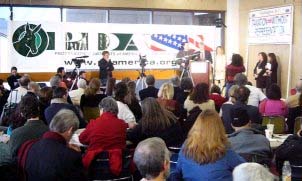Reframe the war in Iraq for all its negative consequences, by connecting its full cost to our full future lacks.
Balance all the costs of this type of unjust war to all these
Future Deficits:
- lack of safety from terrorism
- lack of fuel*
- lack of money
- lack of clean environment to live in
- lack of jobs, life, liberty, health.
- the lives lost
- the growing ill-will with millions of Muslims
- billions $$$ spent will bring future national bankruptcy
- environmental DU damage
- health costs of all the injured or contaminated troops
- moral danger of setting the first attack precedent (Bush says "pre-emptive strike", let's start naming it for what it really was).
In the longer term, if we keep using fossil and nuclear fuel instead of developing clean renewable sources, we risk environmental damage to the atmosphere, and radiation damage in the ground, air, and food.
*Here's the reason I say it will cost us fuel instead of gain it: Grabbing their oil is a short-term fix. When it runs out in 30-50 years, we won't have the time or the money to fix the situation fast enough. Better to start working on safe alternatives before that crisis.
We could make the world safer by putting the billions of dollars we're spending on this war into renewable energy/ conservation breakthroughs now. The USA has left a oversized footprint of environmental damage to planet Earth. For all the damage we've done, I want to start repaying that debt asap!
Spending even half the huge amount of cash in the defense and pentagon budgets could create millions of jobs here in the USA and radically improve education as we retrain and rebuild ourselves into a green nation. For example, how many jobs will it create to super insulate every single dwelling in the nation, and rebuild many to passive solar standards?
By leaving Iraq we will reduce our terrorist threat. Every day we stay compounds the threat.This situation is breeding terrorists. Many Iraqis do not want to live under American occupation. I hear it's not very pleasant over there. Although we have transferred power in name, it is obvious that we still call the shots as long as we have permanent military bases and the controlling interests in the corporations handling the reconstruction.
Instead of creating ill-will, we could build good-will by withdrawing our full presence, but helping fund reconstruction of Iraq by non-American firms, chosen by Iraqis. Remember when Bush said France and Germany couldn't bid on any contracts, and then he went one step further and gave these profitable jobs with no bid to his American buddies? Well this time I think the blackout should be on all American interests. Then we will begin getting safer as our global image changes from greedy imperialists to a caring nation.
The other key step in reducing Islamic hatred of Americans will have to be a radical shift in our Mideast Policy, to be fair and equal to both the Israelis and the Palestinians.
Acting on the wrong side of justice will cost us the American Dream.
Unjust war = no more safety, no more plenty.


